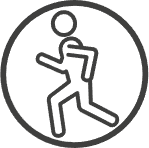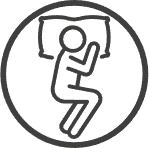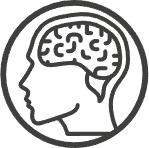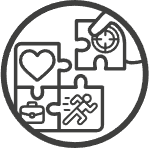The Mental Fitness Toolkit

Movement

Nutrition

Rest

Connection

Mindset

Purpose

Focus

Appreciation

Reframing

Perspective
How It Works
Welcome to Resilience Agenda's Mental Fitness Toolkit, designed to help you protect your mental health.
What is the Toolkit all about? It's a practical, empowering and scientifically-backed set of ten habits and skills to help you stay calm, focused and productive. When life gets busy or overwhelming, you'll feel calm and in control as you navigate daily challenges, unexpected setbacks and life-changing adversity.
Backed by the most powerful insights from the science of wellbeing, the Toolkit helps you develop the knowledge, confidence and skills to cope and succeed, no matter what's happening around you.
The Foundations Of Wellbeing
Movement
One of the most effective ways to protect and improve our mental health, movement is about more than simply exercise. It’s anything we do to avoid being sedentary. More than just a way to improve our physical health, movement is also an essential tool for protecting our mental health, helping us sleep better, relieve chronic stress and help calm our emotions.


Movement
One of the most effective ways to protect and improve our mental health, movement is about more than simply exercise. It’s anything we do to avoid being sedentary. More than just a way to improve our physical health, movement is also an essential tool for protecting our mental health, helping us sleep better, relieve chronic stress and help calm our emotions.
Nutrition
New science is showing just how important what we eat and how we it is for regulating our gut health, impacting how we feel, and helping prevent inflammation and promote metabolic health. Good nutrition is about more than just avoiding too many junk or ultra-processed foods. Instead, it’s about ensuring that we get plenty of nutrients contained in whole-grains, vegetables and healthy fats, as well as adopting habits that make healthy eating the default rather than the exception.


Nutrition
New science is showing just how important what we eat and how we it is for regulating our gut health, impacting how we feel, and helping prevent inflammation and promote metabolic health. Good nutrition is about more than just avoiding too many junk or ultra-processed foods. Instead, it’s about ensuring that we get plenty of nutrients contained in whole-grains, vegetables and healthy fats, as well as adopting habits that make healthy eating the default rather than the exception.
Rest
Rest is one of the most overlooked ways to beat stress and protect our mental health. The problem is, so many aspects of our modern lifestyles conspire against rest and good sleep. More than simply getting enough good quality sleep, rest is about taking short regular breaks throughout the day before we need them to maintain our energy and focus and time-blocking short periods away from our regular routines to help beat chronic stress.


Rest
Rest is one of the most overlooked ways to beat stress and protect our mental health. The problem is, so many aspects of our modern lifestyles conspire against rest and good sleep. More than simply getting enough good quality sleep, rest is about taking short regular breaks throughout the day before we need them to maintain our energy and focus and time-blocking short periods away from our regular routines to help beat chronic stress.
Connection
Social connection is one the most effective ways we can both give emotional support to others, as well as receive social support ourselves. Social connection reduces feelings of isolation, provides a buffer against stress, and offers us a way to add meaning and purpose to our lives. More than simply ‘adding people’ to our lives, it’s about deepening the existing social bonds we already have so that we experience greater fulfillment and purpose.


Connection
Social connection is one the most effective ways we can both give emotional support to others, as well as receive social support ourselves. Social connection reduces feelings of isolation, provides a buffer against stress, and offers us a way to add meaning and purpose to our lives. More than simply ‘adding people’ to our lives, it’s about deepening the existing social bonds we already have so that we experience greater fulfillment and purpose.
Mindset
A positive mindset, characterized by a growth mindset, viewing challenges as opportunities, and maintaining optimism, is essential for protecting mental health. A growth mindset allows us to view mistakes as opportunities for learning, and not personal faults. A challenge mindset means we see setbacks as a chance to grow, while an optimistic mindset helps us to avoid the all-too-common ‘negativity bias’ that leads to catastrophic thinking and depression.


Mindset
A positive mindset, characterized by a growth mindset, viewing challenges as opportunities, and maintaining optimism, is essential for protecting mental health. A growth mindset allows us to view mistakes as opportunities for learning, and not personal faults. A challenge mindset means we see setbacks as a chance to grow, while an optimistic mindset helps us to avoid the all-too-common ‘negativity bias’ that leads to catastrophic thinking and depression.
The Daily Skills Of Mental Fitness
Purpose
Having a clear sense of purpose gives direction and meaning to life. Purpose-driven individuals often report higher levels of satisfaction and resilience, as they are often motivated by something larger than their own ambitions and challenges. Purpose provides a sense of fulfillment and helps people allocate their time and make decision even during challenging times, ultimately contributing to a stronger level of Mental Fitness.


Purpose
Having a clear sense of purpose gives direction and meaning to life. Purpose-driven individuals often report higher levels of satisfaction and resilience, as they are often motivated by something larger than their own ambitions and challenges. Purpose provides a sense of fulfillment and helps people allocate their time and make decision even during challenging times, ultimately contributing to a stronger level of Mental Fitness.
Focus
Focus is the ability to choose and direct the object of our attention. Including concepts of awareness and mindfulness, focus is about being able to consciously choose our thoughts instead of being led by anxious or pessimistic ones. In the digital world, focus means remaining conscious of the effect that online life has on our wellbeing and productivity.


Focus
Focus is the ability to choose and direct the object of our attention. Including concepts of awareness and mindfulness, focus is about being able to consciously choose our thoughts instead of being led by anxious or pessimistic ones. In the digital world, focus means remaining conscious of the effect that online life has on our wellbeing and productivity.
Appreciation
Appreciation is the ability and habit of noticing what is good in our lives despite competing challenges. More than simply gratitude, appreciation includes the positive emotions of awe and the intentional and deliberate practice of savoring noteworthy experiences. When we regularly express appreciation, we avoid spirals of negative thinking which help protect our resilience and mental health.


Appreciation
Appreciation is the ability and habit of noticing what is good in our lives despite competing challenges. More than simply gratitude, appreciation includes the positive emotions of awe and the intentional and deliberate practice of savoring noteworthy experiences. When we regularly express appreciation, we avoid spirals of negative thinking which help protect our resilience and mental health.
Reframing
Reframing is the ability to recognize that our automatic thoughts and our external experiences do not automatically have to define our experience. In other words, we get to choose how we respond to the circumstances of our lives, rather than reacting passively. The key to reframing is the ability to find opportunities to learn and grow from negative situations, and most importantly, to focus on what we can control and influence.


Reframing
Reframing is the ability to recognize that our automatic thoughts and our external experiences do not automatically have to define our experience. In other words, we get to choose how we respond to the circumstances of our lives, rather than reacting passively. The key to reframing is the ability to find opportunities to learn and grow from negative situations, and most importantly, to focus on what we can control and influence.
Perspective
Perspective is about building our awareness so that we learn to move beyond our own ego and concerns, and begin to see reality as it really is. Perspective means seeing our problems from different points of view - as we compare them to other problems, compare them to our problems over time, or compare them to the 'bigger picture.' Perspective is also about being able to see things from the point of view of others, which reduces conflict and strengthens relationships.


Perspective
Perspective is about building our awareness so that we learn to move beyond our own ego and concerns, and begin to see reality as it really is. Perspective means seeing our problems from different points of view - as we compare them to other problems, compare them to our problems over time, or compare them to the 'bigger picture.' Perspective is also about being able to see things from the point of view of others, which reduces conflict and strengthens relationships.
Ready to Make Mental Fitness a Way of Life?
Get Your 2025 Mental Fitness Diary & Planner Today!